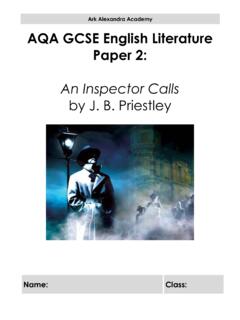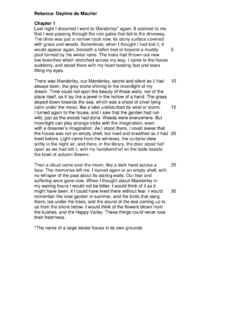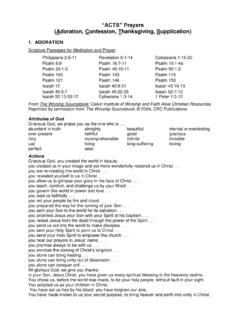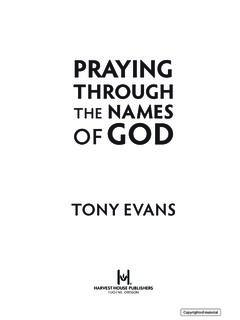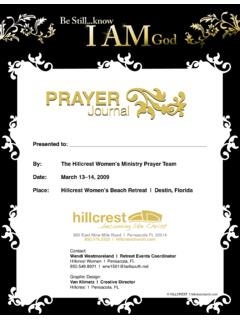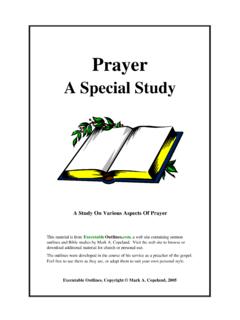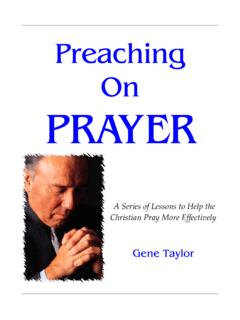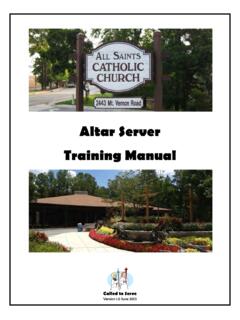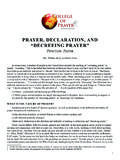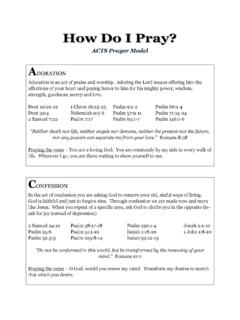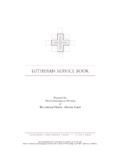Transcription of GCSE Religious Studies Christianity - Ark Alexandra Academy
1 1 GCSE Religious Studies Christianity Practices Workbook Name: 2 Forms of Worship There are four forms of worship you need to know: 1. Liturgical worship 2. Non-liturgical worship 3. Informal worship 4. Private worship Liturgical Worship This type of worship is found in services in the Roman Catholic, Orthodox and Church of England (Anglican) churches. Some acts of worship require a liturgy (a set order or pattern), for example, Roman Catholic Mass. Features of liturgical worship are: a set structure to the service, the use of set prayers and readings. Some Christians see it as old fashioned or very traditional . The service follows the text of a prayer book and is not improvised at all. Liturgical worship often takes place in a church, but not always, for example, a papal open-air Mass or an Anglican Eucharist in the home of a sick person. Some Christians prefer liturgical worship: the familiarity of the service makes them feel secure and they can join in with ease. They know exactly what to expect even in a church where they have never been before.
2 They like the dignity that is typical of liturgical worship and think there is a variety and choice within the set structure. Non-Liturgical Worship Other Christians prefer a more information style of worship. They think that liturgical acts of worship is typical of some nonconformist churches and tends to be Bible-based. It often follows a structure (for example, hymn, prayer, reading, hymn, sermon, prayer, hymn) but the service leader has free choice within that structure. They may choose a relevant theme for events in the world or community. The minister or person leading worship will choose Bible readings that will be based on the theme of the sermon. Prayer is usually in the person s own words and personal style, known as extemporary prayer. Informal Worship Charismatic worship is a form of individual worship. The service has the characteristics of other forms of worship (hymns, sermon, prayer, readings), but it is very free-flowing. On charismatic (spirit-inspired) worship, the worshippers often speak in tongues (outbursts of praise in words that are not intelligible, but which express the person s devotion to God.)
3 This is seen as the gift of the Holy Spirit. Singling, often accompanied by music, is 3 lively. This has much more of a relaxed feel to it. Some Christians believe it comes more from the heart. Evangelical churches are often charismatic in style. These have become more popular in recent church history in Britain. The Bible Regardless of the type of worship, it will always have a focus on the Bible. Many Christians believe the Bible to be inspired by God and for some it is the word of God. So it has a central place and importance in any act of worship. Use of the Bible in worship The bible may be processed Many hymns are based on the Bible, for example, The Lord is my Shepherd (Psalm 25) Portions of the Bible are read aloud Sermons are often based on a bible passage Quaker meetings Quakers (the Society of Friends) have a very distinctive form of informal worship. There is no leader and no set structure at all. Those present usually sit in chairs forming a circle around a table on which there are a Bible and the book of Quaker writings.
4 The worshippers sit in silence, until someone feels called to share thoughts with others. 4 Tasks: 1. Explain liturgical worship.. 2. Explain non-liturgical worship.. 3. Explain informal worship.. 4. How is the Bible used in worship? .. 5. Explain Quaker worship.. 5 Private Worship Christians believe that private worship (worshipping on their own) is just as important as public worship. It can take place anywhere. It may be liturgical in structure, for example, an Anglican saying Morning and Evening prayer every day, or a Roman Catholic saying the Rosary. Some Roman Catholics say three times daily the Angelus, which is a structured series of short meditations on the incarnation. It may be non-liturgical, perhaps starting with reading a passage from the Bible or meditating. Christians might go into a church while they are out shopping, so that they can spend a short time worshipping God, shutting out the pressures and concerns of daily life. Those travelling, for example by train, might use the time for silent worship.
5 Worshipping alone allows worship to be exactly how the person wants it and to feel close to God as they are alone with God and their thoughts. The Rosary The Rosary is a string of beads with a crucifix attached. Saying the Rosary involved running one s hands through the set of beads and saying certain set prayers (the Lord s Prayer, the Hail Mary and the Glory be to the ) while touching each bead. Meditation Meditation is thoughtfulness, focused on a Religious truth. Christians often use a stimulus, for example, they might sit in front of a candle, focusing on Christ the Light of the world. They might meditate on a picture, which may be specifically Religious (perhaps an icon of Jesus) or show a beautiful scene from nature. Other Christians might read a passage from the Bible and think about its message. In a church, a Christian might stand before and meditate on each of the Stations of the Cross (visual portrayals of the suffering of Jesus). Why worship is important for Christians (any form of worship): It brings a sense of togetherness with the community It makes them feel closer to God It is peaceful allowing for prayer and meditation In worship Christians praise God as the eternal being and source of everything that exists Alleluia or Hallelujah means Praise the Lord It is an external expression of their faith 6 Tasks: 1.
6 Where can Christians worship privately? Give examples.. 2. What is the Rosary? How does it help worship? .. 3. What is meditation? How does it help worship? .. 4. Why is worship important in Christianity ? Give several arguments.. 7 Prayer Prayer is not just about asking God for things and expecting to get them. For Christians, it is about listening, being open to the guidance of the Holy Spirit and doing what God wants them to do. There are several types of prayer. A way of remembering them is to think in terms of the hand of prayer . Praise/adoration is the basis of all prayer. It has been said that the whole of life should be an act of thanksgiving . The forefinger is used to point in accusation so it represents the opposite. Christians believe that balanced prayer includes many or all of these aspects. Jesus spoke about prayer on a number of occasions. In parables, he made the point that persistence can make even the most corrupt and self-centred people sometimes give in.
7 Jesus point was that if humans could be persuaded, then an all-loving God would definitely respond to the needs of those praying. Jesus also stated that humility and honesty in prayer were very important. Set Prayers Set prayers form a key part of liturgical worship, but many Christians also use them for private prayer. Many were written by great thinkers, literary figures and above all, deeply Religious men and women. Some come from the Bible, such as the prayer starting with, The grace of our Lord Jesus that is often said in both public and private worship and is taken from 2 Corinthians 13:14. Perhaps the simplest of all set prayers is the Jesus Prayer which says, Lord Jesus Christ, Son of God, have mercy on me, a sinner. It is an Eastern Orthodox prayer which dates back to the fourth century, 8 but it has become popular with Christians in other denominations as it is so simple, yet profound. It is meant to be said and repeated many times, like chanting. Whilst repeating it, a person meditates.
8 Some also use rhythmic breathing as they say the prayer. The first part is said while inhaling and the second part while exhaling. The Lord s Prayer This prayer is especially important for Christians as it was the prayer that Jesus himself taught his disciples when they asked him how they should pray. It contains some of the key aspects of prayer: praise, confession, prayer for others and prayer for oneself. The Lord s Prayer Its meaning Our Father in heaven Father reminds Christians that the God who created the universe loves and cares for each individual. Our reminds us that God s love knows no boundaries and that Christians are part of a community. In heaven is a reminder that God is not a human father. It stresses His eternity and transcendence. Hallowed be thy name May God be treated with honour and respect Your kingdom come May God s kingship and authority be recognised and accepted by all Your will be done, on earth as it is in heaven May God s purposes be carried out as fully in the created world as they are within the eternal sphere of heaven Give us today our daily bread Christians ask God to give them (and everyone) all they need for the day.
9 This includes spiritual and emotional as well as physical needs. Forgive us our sins Christians acknowledge that they fail to live up to their calling and are in need of God s forgiveness As we forgive those who sin against us A reminder that if they are not forgiving, they make themselves unable to receive God s forgiveness And lead us not into temptation A prayer not to be tested beyond their powers to resist But deliver us from evil Acknowledgement of their need of God in the struggle against all that is evil in the world For the kingdom, the power and the glory are yours now and forever All the previous petitions are possible because God is the omnipotent and majestic ruler of all Amen A Hebrew word that means so be it . Christians end their prayers with this word to show they mean and assent to what they say Informal Prayer In public worship, this takes the form of extemporary prayer. Most Christians use their own words at least some of the time in their private prayers.
10 Many prefer informal prayer to set prayers as they seem to come more directly from the heart, meeting their particular concerts. One type of informal prayer is known as the arrow prayer. These are very short prayers addressed to God spontaneously at a time of urgent need or in response to a particular situation. In a time of personal crisis a Christian might pray, Help me God, or respond to getting through a crisis with, Thank you God . 9 Tasks: 1. What are the different types of prayer? .. 2. Explain what set prayers are.. 3. What is the function and meaning of the Lord s Prayer? .. 4. Explain what informal prayers are, including arrow prayers.. 10 The Sacraments The term Sacrament has been defined as the external and visible sign of an inward and spiritual grace . In other words, a sacrament is something people can experience with their senses (see, taste, smell, hear, and touch). But there is a deeper reality to it which cannot be experienced through the senses. The Protestant traditions generally acknowledge only the two sacraments of baptism and the Eucharist.
